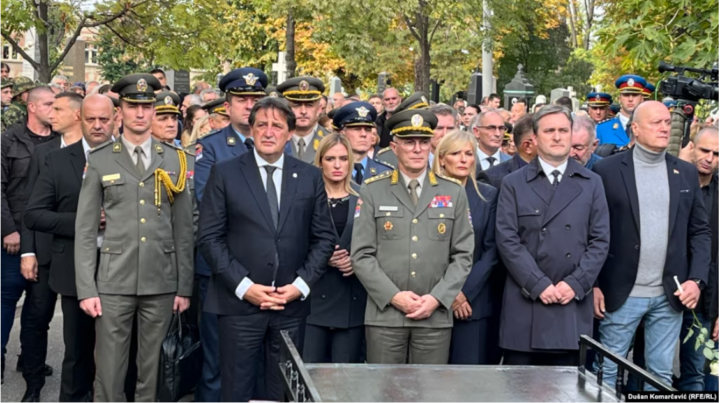Nebojša Pavković, a convicted war criminal for atrocities committed against ethnic Albanians in Kosovo in 1999, was buried with full state and military honors on Tuesday in the Alley of Distinguished Citizens in Belgrade, Serbia.
The ceremony, held with high-ranking military officials, Serbian government ministers, and representatives of President Aleksandar Vučić, has drawn strong condemnation from human rights organizations and civil society groups.
According to the Humanitarian Law Center (HLC), “The burial of Nebojša Pavković in this location represents an open denial of the facts established by the court and a profound contempt for the victims.”
Pavković, who served as commander of the Third Army of the Yugoslav Army, was sentenced by the Hague Tribunal to 22 years in prison for war crimes against Kosovo Albanians during the 1999 war. He served his sentence in Finland and was released early on September 28 at the request of the Serbian government due to poor health. He died on October 20, at the age of 79.
High-Level Attendance and Controversy
Pavković’s funeral was attended by senior Serbian officials, including Defense Minister Bratislav Gašić, Minister Milica Đurđević Stamenkovski, and Foreign Minister Nikola Selaković, as well as Chief of the Serbian Armed Forces Milan Mojsilović.
Also present were former intelligence chief Aleksandar Vulin and Veljko Odalović, head of Serbia’s Government Commission on Missing Persons.
President Aleksandar Vučić sent a wreath through his adviser Suzana Paunović, and his son Danilo Vučić attended in person.
The Serbian Army Guard performed military honors during the ceremony, which was also attended by several individuals convicted by the Hague Tribunal, including Vladimir Lazarević, Nikola Šainović, and Veselin Šljivančanin.
“This is an insult to everyone already buried there,” said Aleksandar Popov from the Center for Regionalism, referring to the prestigious cemetery where Serbian writers, politicians, and artists are also laid to rest.
Nataša Kandić, founder of the Humanitarian Law Center, stated that by granting state honors to a convicted war criminal, the government is pressuring Serbian society, especially young generations, to view war criminals as heroes who ‘defended the Serbian people.’
Popov warned that “this glorification of war criminals” serves as a dangerous form of indoctrination, potentially preparing future generations for repetition of past crimes.
Crimes and Conviction
During the NATO bombing campaign in 1999, Pavković commanded the Third Army of the Yugoslav Army, which was responsible for mass deportations, killings, and persecution of Kosovo Albanian civilians.
In 2009, the International Criminal Tribunal for the former Yugoslavia (ICTY) found him guilty on all charges, including murder, forced displacement, and persecution. His conviction was upheld in 2014.
In May 2022, the International Residual Mechanism for Criminal Tribunals (IRMCT) rejected Pavković’s request for early release, citing the gravity of his crimes and lack of rehabilitation.
He was extradited to The Hague in 2005, alongside other senior officials — Dragoljub Ojdanić, Vladimir Lazarević, Sreten Lukić, and Nikola Šainović — all convicted for their roles in the Kosovo war.







